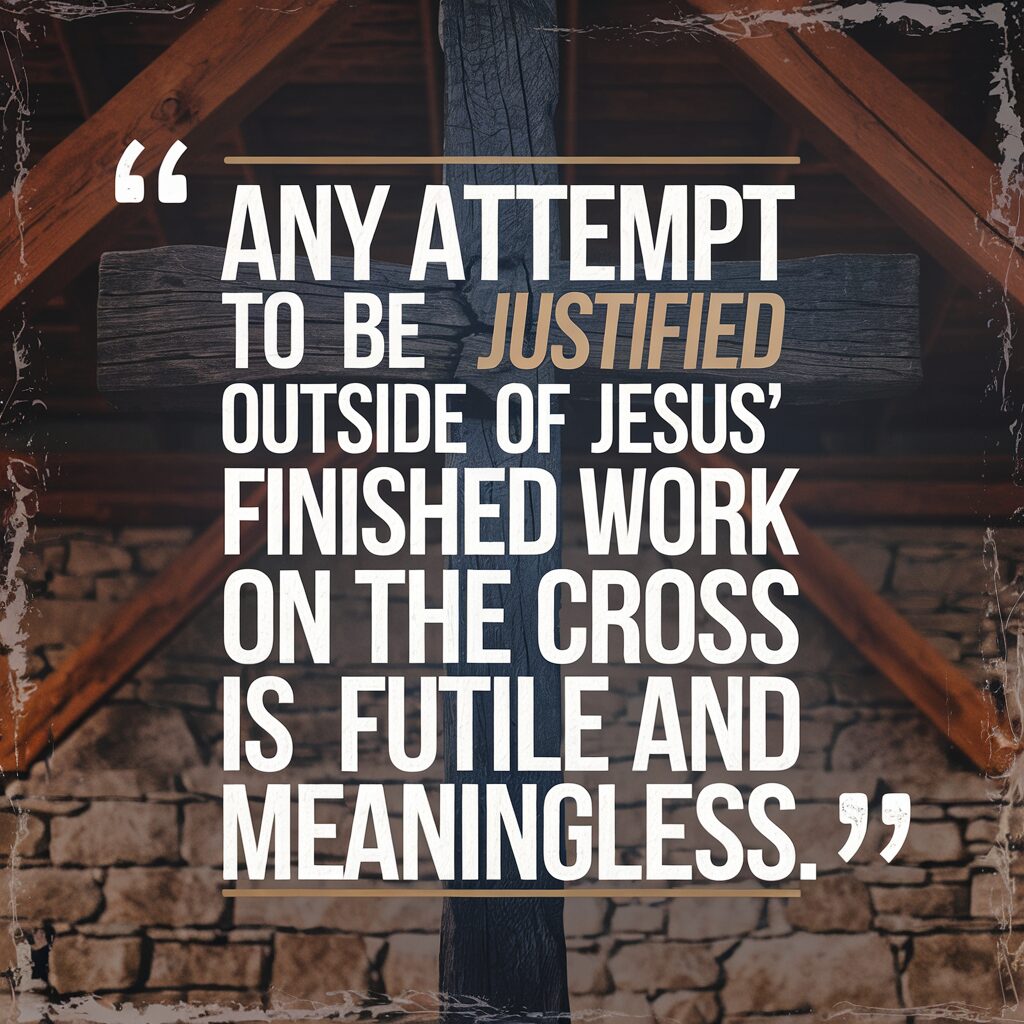Highlight Reel
Sermon Summary
The passage from Galatians 2:15-21 illustrates the transformative power of faith in Christ. Paul explains that believers have been crucified with Christ and now live by faith in Him. This faith is not just a mental assent but a deeply personal and relational connection with God. Through faith, believers are justified and made righteous, not because of their own efforts but because of Christ’s sacrifice. This message encourages believers to rest in the finished work of Christ, recognizing that any attempt to justify themselves outside of faith in Him is futile and meaningless.
Sermon Audio
Shareable Quote graphics



Sermon Text
Crucified with Christ: The Battle for Justification
Nate Roten / Galatians 2:15–21
Main Idea
Jesus’ sacrifice on the cross is the ultimate act of grace that justifies us, and our faith in Him is what makes us righteous.
Recap last week, sermon.
Today’s passage is a continuation of Paul and Peter’s confrontation. They are still standing nose to nose as Paul rebukes his behavior, which is born of fear. He just exposed Peter’s hypocrisy, saying:
Galatians 2:14 CSB
“…If you, who are a Jew, live like a Gentile and not like a Jew, how can you compel Gentiles to live like Jews?”
Now, he will unpack exactly what he means by that statement.
Passage
Galatians 2:15–21 CSB
We are Jews by birth and not “Gentile sinners,” and yet because we know that a person is not justified by the works of the law but by faith in Jesus Christ, even we ourselves have believed in Christ Jesus. This was so that we might be justified by faith in Christ and not by the works of the law, because by the works of the law no human being will be justified. But if we ourselves are also found to be “sinners” while seeking to be justified by Christ, is Christ then a promoter of sin? Absolutely not! If I rebuild those things that I tore down, I show myself to be a lawbreaker. For through the law I died to the law, so that I might live for God. I have been crucified with Christ, and I no longer live, but Christ lives in me. The life I now live in the body, I live by faith in the Son of God, who loved me and gave himself for me. I do not set aside the grace of God, for if righteousness comes through the law, then Christ died for nothing.
I – The Misplaced Jewish Confidence
Paul and Peter were born Jewish. The Jews are God’s covenant people who received His law through Moses. The law is how God’s people learned to live according to His holy standards (the knowledge of sin comes through the law – Romans 3:20). These were God’s moral, ceremonial, judicial, and dietary rules and regulations required for being in right standing with Him and demonstrating their separation from the rest of the world as His people.
The Gentiles were not chosen as God’s people and have not received the law. Therefore, Jews viewed Gentiles as unclean and sinful. This mentality is clearly divisive and contrary to the work Christ is doing in His church.
For some, this undoubtedly made them arrogant, but having the law also gave them a different standing before God. It’s not just that they were better people because they had God’s law, while the Gentiles didn’t; they believed that having and keeping this law had a specific effect. Paul introduces the word “justification” for the first time in his letter to explain this effect.
Which makes you wonder… what exactly does that mean?
II – Justification
δικαιόω ( dikaioō ), vb. To justify, declare righteous, vindicate, acquit.
This is primarily a judicial term whereby God, as the divine Judge, slams the gavel and declares the defendant not guilty, acquitted, and free from the consequences of our trespasses. It is an amazing act of mercy and grace because we know that we are, in fact, guilty.
It is also a declaration of righteousness. Being acquitted of guilt is half of the story, but you are also now fully righteous, but not because it is now inherent. God does not draw out righteousness from within. It is given to you by Christ and credited to you. Now, when God looks at you, He sees the righteousness of His Son, not your guilt!
The nature of justification, then, is our right or wrong standing with God. Are we justified or condemned? Paul mentions justification four times in this passage, making it clear that we need it and that it’s important. However, the million-dollar question is: “How do we get it?”
This is where the big debate takes place. Two origins are discussed. In the Jewish mind, justification comes through the “works of the law,” which is mentioned three times. Paul advocates that it ONLY comes through “faith in Christ,” which is also mentioned three times. It is abundantly clear that it CANNOT be both.
There is such a drastic contrast, so it would be helpful to look at each individually.
III – Works of Law
Galatians. What exactly is this? This phrase occurs only in Galatians and Romans. It is mentioned three times in our passage today: 3:2, 3:5, and 3:10, and also in Romans 3:20 and 3:28.
Gal 2:16 and yet because we know that a person is not justified by the works of the law but by faith in Jesus Christ, even we ourselves have believed in Christ Jesus. This was so that we might be justified by faith in Christ and not by the works of the law, because by the works of the law no human being will be justified.
Gal 3: 2 I only want to learn this from you: Did you receive the Spirit by the works of the law or by believing what you heard?
Gal 3:5 So then, does God give you the Spirit and work miracles among you by your doing the works of the law? Or is it by believing what you heard—
Gal 3:10 For all who rely on the works of the law are under a curse, because it is written, Everyone who does not do everything written in the book of the law is cursed.
According to Galatians 3:2,5, we receive the Spirit through believing what we heard (or faith when hearing the gospel), not by works of the law. Therefore, in their view, it is a matter of salvation. In Galatians 3:10, all who rely on the works of the law are under a curse, even if you break just one law. These are concepts that Paul has already communicated to the Galatian churches.
Romans. Now, let’s see what we can gather from the letter to the Romans.
Rom 3:20 For no one will be justified in his sight by the works of the law, because the knowledge of sin comes through the law.
Rom 3:28 For we conclude that a person is justified by faith apart from the works of the law.
Here, Paul says one cannot be justified by works of law, because knowledge of sin comes through the law. This goes beyond national identity in things such as circumcision and explains the moral component. The law reveals what sin is, but it cannot do anything about it, and no one can keep it perfectly. Therefore, there is no justification through the works of the law. It must be found elsewhere, which is his concluding point in v. 28.
So, if it is found elsewhere, utterly separate from the works of the law (or the obedience to the fullness of the Mosaic law), where does it come from?
IV – Faith
As Paul says, it comes through faith in Jesus!
If condemnation means that I have sinned and the penalty of sin remains squarely on my shoulders, then I am guilty. But because we have faith in Christ, that guilt is removed. Why? Because Jesus took on the punishment for our sin. The God we sinned against bore the punishment, so He is just in setting us free. As an outcome, we are righteous. We are back in right standing with God because of Jesus.
The sentiment from Jonathan Edwards’s works is: “You contribute nothing to your salvation except the sin that made it necessary.”
We see Jesus provide a simple parable that helps us understand this fact in Luke 18:
Luke 18:9–14 CSB
He also told this parable to some who trusted in themselves that they were righteous and looked down on everyone else: “Two men went up to the temple to pray, one a Pharisee and the other a tax collector. The Pharisee was standing and praying like this about himself: ‘God, I thank you that I’m not like other people—greedy, unrighteous, adulterers, or even like this tax collector. I fast twice a week; I give a tenth of everything I get.’
“But the tax collector, standing far off, would not even raise his eyes to heaven but kept striking his chest and saying, ‘God, have mercy on me, a sinner!’ I tell you, this one went down to his house justified rather than the other, because everyone who exalts himself will be humbled, but the one who humbles himself will be exalted.”
The Pharisee pointed to his own efforts to be righteous, while the tax collector acknowledged his guilt and threw himself at mercy of God.
This ties in perfectly with the intimately personal nature of justification.
V – Right-Standing
In Jesus’ parable, the individual makes a declaration of sinfulness and Jesus makes it clear that God justified this man. He was repentant so God cleared him of his guilt.
The same goes for the passage today. Notice how we relate to God and how it connects to the individual:
God (as Jesus or the Father) is:
• the object of my faith (v. 16)
• the one who justifies me (v.17)
• the purpose of my newly resurrected life (v. 19)
• the source of my newly resurrected life after being crucified with Christ (v. 20)
• the giver of grace that makes me righteous (v. 21)
Galatians 2:15–21 CSB
We are Jews by birth and not “Gentile sinners,” and yet because we know that a person is not justified by the works of the law but by faith in Jesus Christ, even we ourselves have believed in Christ Jesus. This was so that we might be justified by faith in Christ and not by the works of the law, because by the works of the law no human being will be justified. But if we ourselves are also found to be “sinners” while seeking to be justified by Christ, is Christ then a promoter of sin? Absolutely not! If I rebuild those things that I tore down, I show myself to be a lawbreaker. For through the law I died to the law, so that I might live for God. I have been crucified with Christ, and I no longer live, but Christ lives in me. The life I now live in the body, I live by faith in the Son of God, who loved me and gave himself for me. I do not set aside the grace of God, for if righteousness comes through the law, then Christ died for nothing.
Do you see now just how important this one word is? It is foundational to our faith, how we relate to God, and how God relates to you! And anything that is foundational is worthy of reflection. We’ve seen how Jews in the first century tried to justify themselves, but people today also attempt to justify themselves before God in many ways, often relying on their own efforts, morality, or external achievements rather than on Christ’s finished work. Here are some common ways people seek to feel vindicated and acceptable before God:
1. Moral Performance – Many believe that living a “good” life—being kind, honest, charitable, and avoiding major sins—earns them favor with God. They see their moral record as the basis of their righteousness.
2. Religious Rituals – Some rely on religious activities like attending church, praying, fasting, or giving to charity as a way to prove their worthiness before God. While these are good practices, they are often mistaken as a means of earning salvation rather than a response to grace.
3. Comparison to Others – Many justify themselves by thinking, “At least I’m not as bad as that person.” They measure their righteousness based on human standards rather than God’s holiness, which requires perfection (Matthew 5:48).
4. Self-Improvement & Personal Growth – In a culture that values self-actualization, some believe that becoming the best version of themselves—through discipline, success, or overcoming hardships—makes them acceptable to God. They see salvation as a self-help journey rather than a divine act. This would be as silly as getting in shape before going to the gym when the entire point of going to the gym is to get in shape!
5. Good Deeds Outweighing Bad – Many assume a “cosmic scale” approach, believing that if their good deeds outweigh their bad ones, God will accept them. This view ignores the reality that even one sin makes us guilty before a holy God (James 2:10).
6. Blaming Circumstances or Others – Instead of acknowledging their own sin, some justify themselves by pointing to their difficult circumstances, upbringing, or the faults of others, believing these factors excuse their shortcomings before God.
7. Emotional Experience & Sincerity – Some equate strong religious feelings or sincerity with justification, believing that as long as they “mean well” or have passion for spiritual matters, God will accept them. However, sincerity, apart from truth, is not enough (John 14:6). Or perhaps you’re someone who depended on your sincerity when you prayed the “sinner’s prayer,” but later you question whether you said it correctly or meant it deeply enough. This is not resting in the finished work of Christ, who alone is your Savior and Justifier.
Ultimately, all these efforts fall short because justification before God comes only through faith in Christ Jesus. True vindication is found not in our works but in Jesus’ perfect righteousness, imputed to us by grace through faith (2 Corinthians 5:21).
VI – Tying it all together
Tearing down the wall. Jews and Gentiles alike stand before God as sinners. Any attempt to be justified outside of Jesus’ finished work on the cross is futile and meaningless. Putting Jews in the category of “sinners” on par with the Gentiles does not mean that anything goes and the law is tossed out of the window. Paul seems to be anticipating an argument when he asks, “Is Christ a promoter of sin?”… as if to say that since we can’t rely on works of the law, then I suppose Christ is okay if we sin all we want to without reservation or consequence. As we saw, the law is necessary to show us what sin is, but it’s not what justifies us. Only faith in Jesus can do that, so once a person grasps that, they are (as Paul puts it) “tearing down the wall.” Therefore, if you try to gain justification through works of the law, then you are negating Jesus’ atoning sacrifice and trying to rebuild it, which is considered a sin.
Ironically, it is through the law that we die to the law. The law was Israel’s guardian until the Messiah came (Gal. 3:24). There was a covenantal relationship with the law, and now, we have died to it, thereby being released from it (Rom. 7:1-4).
Life in Christ. How did I die, you might ask? I died to the law, my sin, and my former self when I reached out to take hold of Christ in faith. Since he paid the penalty for my sin, I have (in a way) been crucified with Christ. That person is now dead! But since Jesus rose from the grave, I also am alive in Him! Now, I can live as a new creation in the newness that faith brings… fully justified, glorified, and made righteous by the one who loved me and gave himself for me.
And, to drive home the point, Paul finishes with a proclamation that the faith that justifies is an act of God’s grace. If anything is added to it, you might as well consider Jesus’ death as pointless.
Questions to Consider
- How does this passage challenge or confirm your beliefs about salvation and justification? Are there any attitudes or assumptions you need to change based on this passage?
- What is the main point of the passage?
- How does Paul define justification, and what does it mean for believers?
- According to Paul, how are we justified? (By faith in Christ or by works of the law?) What does Paul mean by “works of the law,” and why are they insufficient for justification?
- Paul couldn’t be any clearer. You cannot generate your own acquittal and right-standing. Jesus’ sacrifice on the cross is the ultimate act of grace that justifies us, and our faith in Him is what makes us righteous.
FAQs
Frequently Asked Questions Based on the Sermon “Crucified with Christ: The Battle for Justification”
1. What is the main point of the passage?
- The main point of the passage is that justification before God comes solely through faith in Jesus Christ, and not through any works of the law. Paul emphasizes that our salvation is not earned by our actions but is a gift of God’s grace through faith in Christ (Galatians 2:15-21).
2. How does Paul define justification, and what does it mean for believers?
- Paul defines justification as a judicial act where God declares a person righteous, not because of their inherent righteousness but because of Christ’s perfect righteousness credited to them. This means believers are acquitted of their guilt and are now fully righteous in God’s sight (Galatians 2:16, Romans 3:28).
3. According to Paul, how are we justified? (By faith in Christ or by works of the law?) What does Paul mean by “works of the law,” and why are they insufficient for justification?
- Paul clearly states that we are justified by faith in Jesus Christ, not by the works of the law. The phrase “works of the law” refers to the Jewish law given through Moses, which includes moral, ceremonial, and dietary regulations. These works are insufficient for justification because no one can keep the law perfectly, and thus, it cannot declare anyone righteous (Galatians 2:16, Romans 3:20).
4. How does this passage challenge or confirm your beliefs about salvation and justification? Are there any attitudes or assumptions you need to change based on this passage?
- This passage challenges the belief that salvation can be earned through good deeds or moral performance. It confirms that salvation is a gift of God’s grace through faith in Christ. Believers should change their attitude from relying on their own efforts to recognizing that justification comes solely through faith in Jesus Christ. This means acknowledging that any attempt to justify oneself outside of Christ’s finished work on the cross is futile and that true vindication is found in Christ’s perfect righteousness (Galatians 2:15-21, Romans 3:28).
5. What does it mean to be “crucified with Christ,” and how does this relate to our daily life?
- To be “crucified with Christ” means that we have died to our old selves and our sinful nature. This death is not physical but spiritual, as we have been released from the law and its demands. In Christ, we now live a new life, not by our own efforts but by faith in the Son of God who loved us and gave himself for us (Galatians 2:20).
6. How do the Pharisee and the tax collector in Luke 18:9-14 illustrate the concept of justification?
- The Pharisee in Luke 18:9-14 illustrates the error of trying to justify oneself through one’s own righteousness. He boasted about his good deeds, but he was not justified because he did not acknowledge his sin. In contrast, the tax collector, who humbled himself and acknowledged his sin, was justified because he recognized his need for mercy and threw himself on God’s grace (Luke 18:9-14).
7. What are some common ways people seek to feel vindicated and acceptable before God, and why do these efforts fall short?
- Common ways people seek to feel vindicated include moral performance, religious rituals, comparison to others, self-improvement, good deeds outweighing bad, blaming circumstances or others, and emotional experience. These efforts fall short because they do not recognize the need for God’s grace and the finished work of Christ. True vindication comes only through faith in Jesus Christ (Galatians 2:15-21, Romans 3:28).
- 8. How does the law relate to justification, and why is it necessary to die to the law in order to live for God?
- The law is necessary to reveal what sin is, but it cannot do anything about it. No one can keep the law perfectly, and thus, it cannot justify anyone. By dying to the law, believers are released from its demands and can live a new life in Christ, fully justified and righteous through faith in Him (Galatians 2:15-21, Romans 7:1-4).
